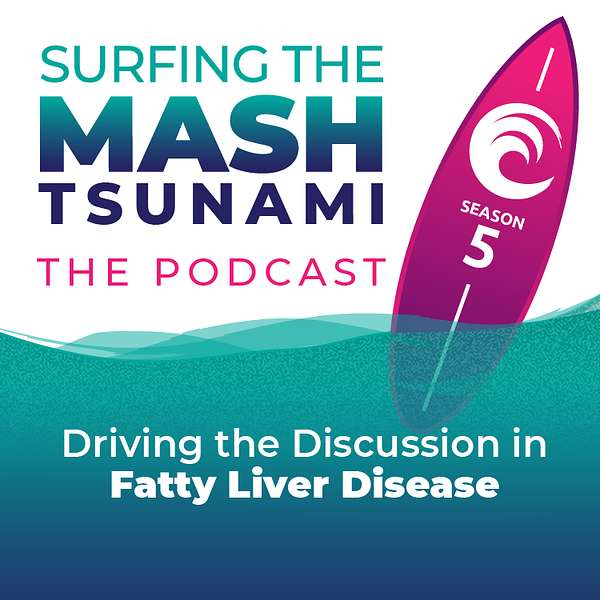
Surfing the MASH Tsunami
Driving the Discussion in Fatty Liver Disease. Join hepatology researcher and Key Opinion Leader Jörn Schattenberg, Liver Wellness Advocate Louise Campbell, and Forecasting and Pricing Guru Roger Green and a global group of Key Opinion Leaders and patient advocates as they discuss key issues in Fatty Liver disease, including epidemiology, drug development, clinical pathways, non-invasive testing, health economics and regulatory issues, from their own unique perspectives on the Surfing the MASH Tsunami podcast. #MASH #MAFLD #FattyLiver #livertwitter #AASLD #GlobalLiver #NoNASH #EASL
Surfing the MASH Tsunami
S5 - E24 - A view of MASLD: Looking back at EASL Congress from six weeks later
00:00:00 - Surf's Up: Season 5 Episode 24
This week's episode on MASLD lessons from the EASL Congress 2024 includes three separate elements: individual interviews with PharmaNext Founder and CEO Mathieu Petitjean and Global Liver Institute Vice President of Liver Programs Jeff McIntyre, followed by a discussion with patient advocates Mike Betel of the Fatty Liver Alliance and José Willemse from the Netherlands, now supporting EASL.
00:02:45 - Introduction
Roger explains the episode format, including the two key questions for Mathieu and Jeff: (i) what were their key takeaways from the EASL Congress, and (ii) how have those takeaways changed how they do their jobs or plan for the future? Roger also sets up the Question of the Week discussion that is today's third section.
00:04:04 - Meet Mathieu Petitjean
This is the SurfingMASH debut for Mathieu Petitjean, Founder and CEO of PharmaNest. He tells the audience a bit about his background and his love of Harleys.
00:07:10 - First question to Matt
Matt begins by describing the core services Pharmest, a digital pathology company, offers MASH drug developers. Then he answers Roger's question by describing three phases in MASLD clinical trial designs. His point is that over time, drugs have gotten better, and histology requirements have become more onerous. At some point in the not-too-distant future, Matt believes non-invasive tests (NITs) are likely to suffice in large Phase 3 trials of the future.
00:21:01 - Second question to Matt
Matt starts the answer with a conditional: if biopsy-based analyses become part of a surrogate endpoint, the role is large and clear. If not, they are unlikely to remain relevant in Phase 3 trials. Regardless of the answer to this question, Matt believes digital pathology will remain important in pre-clinical work and in other continuous liver diseases with less-defined targets. Also, he says, digital pathology is valuable in an array of non-hepatological markets, notably including pathology.
00:29:11 - First question to Jeff
Jeff describes an "overriding sense of optimism" he felt due to the many positive drug trials presented in Milano. This suggests that the MASLD community is developing safe and effective MASH drugs with many different modes of action. This is allowing GLI and other advocates to start to have "more enlightened discussions" about MASLD in the context of the patient's overall metabolic state. All this means that what works in one patient might not in another. This can reshape clinical trials so that the endpoint target might not be change in fibrosis but impact against specific NIT targets. Jeff envisions this line of inquiry as a possible step away from biopsy.
00:39:34 - Second question to Jeff
Concurrently, FDA is beginning to require greater diversity in clinical trial populations. To Jeff, all this makes patient advocates like GLI more valuable to the clinical trial design process and pivotal in ensuring that metabolic and advanced MASH patients will still get the drugs they need. Starting today, Jeff sees advocates as championing underserved groups in the population while at the same time laying the foundation for the longer-term case.
00:55:20 - Discussing previous "Question of the Week"
This is a 15-minute discussion of the Question of the Week we posed at the end of S5 E23. This section will constitute S5 E24.5, which we will post in the next day or two. A more complete summary will appear there.
01:11:23 - Question of the Week
The Question of the Week is the first question Roger asks Matt and Jeff during this episode.
01:12:58 - Business Report
Previewing Episode 25, with Maru Rinella discussing the recently-published expert recommendations on use of resmetirom, along with comments on office hours the reason we will not have a vault conversation this week.